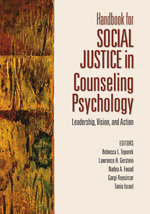Handbook for Social Justice in Counseling Psychology
Leadership, Vision, and Action
- Rebecca L. Toporek - San Francisco State University, USA
- Lawrence Gerstein - Ball State University, USA
- Nadya Fouad - University of Wisconsin - Milwaukee, USA
- Gargi Roysircar - Antioch University New England
- Tania Israel - University of California, Santa Barbara, USA, Asian Institute of Management, Philippines
The Handbook for Social Justice in Counseling Psychology: Leadership, Vision, and Action provides counselling psychology students, educators, researchers, and practitioners with a conceptual road map of social justice and social action that they can integrate into their professional identity, role, and function. It presents historical, theoretical, and ethical foundations followed by exemplary models of social justice and action work performed by counselling psychologists from interdisciplinary collaborations. The examples in this Handbook explore a wide range of settings, with diverse issues, and reflect a variety of actions.
The book concludes with a chapter reflecting on future directions for the field of counselling psychology beyond individual and traditional practice to macro-level conceptual models. It also explores policy development and implementation, systemic strategies of structural and human change, cultural empowerment and respect, advocacy, technological innovation, and third and fourth generations of human rights activities.
Key Features:
o Integrates research and ethical implications as well as guidelines for developing and evaluating specific types of social justice activities
o Addresses a comprehensive arena of issues examined from historical, theoretical, systemic, and practical perspectives
o Clarifies social justice in counselling psychology to distinguish it from other helping professions
o Provides readers with specific examples and guidelines for integrating social justice into their work supported by a solid theoretical framework and acknowledgement of interdisciplinary influences
o Includes contributions from prominent authors in counselling psychology to provide expert examples from the field
The Handbook for Social Justice in Counseling Psychology is an excellent resource for counselling psychology students, educators, researchers, and practitioners. It will be a welcome addition to any academic library or research institution.
“Because social justice work has emerged as one of the hottest topics in the mental health professions over the course of the past five years, the Handbook for Social Justice in Counseling Psychology: Leadership, Vision, and Action is timely and welcome. Although advocacy counseling, social action, and social justice work - collectively referred to as social justice counseling - are popular subjects appearing in numerous journal articles and a handful of books, especially in social work and counseling, to date no counseling psychology text has been focused exclusively on empowerment and advocacy strategies. So, this book will be a groundbreaking volume for counseling psychologists with an interest in social justice counseling. And because the Handbook for Social Justice in Counseling Psychology is well organized, thorough, and scholarly in its coverage, it will be a well-respected contribution to the literature on the subject.”
"Counseling psychologists often focus on clients' inner conflicts and avoid getting involved in the clients' environment. This handbook encourages counseling psychologists to become active participants in changing systems that constrain clients' ability to function. . . . Besides actual programs, the contributors cover research, training, and ethical issues. The case examples showing how professionals have implemented social action programs are particularly valuable. . . . [T]his book provides an outline for action, not only for psychologists, but also for social workers, politicians, and others interested in improving the lot of disadvantaged populations. Summing up: Recommended. Graduate students, researchers, professionals."
"This book provides as outline for action, not only for psychologists but also for social workers, politicians and others interested in improving the lot of disadvantaged populations. Recommended."
This volume is unquestionably the best book in the field for addressing social justice issues in counseling psychology.
not material was looking for

